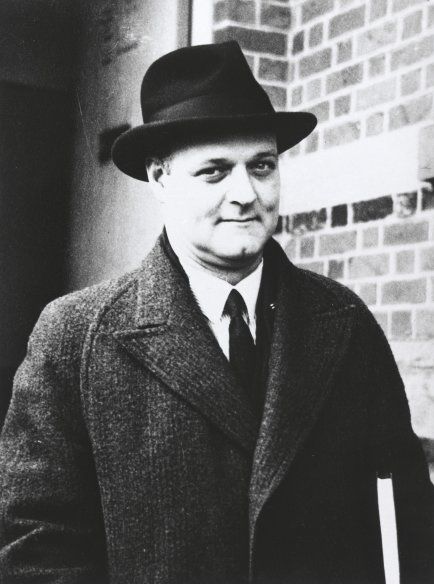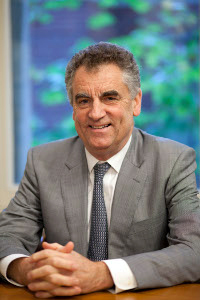The John Barry Memorial Lecture
The John Barry Memorial Lecture
About the John Barry Memorial Lecture

The Honourable Sir John Vincent William Barry, Judge of the Supreme Court of Victoria from 1947, and Foundation Chairman of The Board of Studies in Criminology at the University of Melbourne from 1951, was a distinguished graduate of this University. Sir John did much to stimulate the growth of the study of Criminology, not only at this University but also throughout Australia and abroad. Each year, the John Barry Memorial Lecture seeks to inform and educate on topics of criminological significance, continuing Sir John’s commitment to criminological research.
Learn more about Sir John Barry
(PDF 765.9 KB)
Contact:
2023: ‘We’re doing everything but Treaty’: Law reform and sovereign refusal in the colonial debtscape.
Dr Maria Giannacopoulos
Wednesday 18 October 2023
Abstract
Mary Graham’s turn of phrase, ‘they got a country for free’ cuts right to the heart of the indebted nature of Australia’s colonial sovereignty and encapsulates the underlying criminality structuring ‘Australia’ and its economy. When land, subterranean earth and water are rendered freely available for use without payment, compensation or accountability to Aboriginal peoples, then this limitless accumulation of debt makes possible the very existence and economic standing of contemporary Australia. During the 2007 Global Financial Crisis, considered the worst since the Great Depression, when Australia was busy looking beyond itself to see sovereign debt and austerity, Tony Birch offered a sobering and urgent challenge to Australia: for sovereignty to become a viable concept for discussion among the wider non-Indigenous communities it must take responsibility for its colonial debts.
A country taken for free, the denial of responsibility for that theft and the unpaid debts it has accrued generates the colonial debtscape. Against this backdrop, Dr Maria Giannacopoulos examines the role of colonial law in seeking to displace treaty through reform. In 2023, as Australia pushes urgent calls for treaty aside and moves rapidly towards a referendum to alter but ultimately reaffirm a colonial legal system, the conversation on the role of colonial debt, its continual and ongoing accrual and the brutality of ongoing austerity in the settler colony is yet to take place.
Dr Maria Giannacopoulos
Dr Maria Giannacopoulos is Associate Professor and Director of the Centre for Crime, Law and Justice in the Faculty of Law and Justice at the University of New South Wales, Sydney. She has degrees in law, literature, and a PhD in Cultural Studies and works across the disciplines of law and criminology to reveal the complicity of Australian law with ongoing colonialism.
2022: Governing with integrity
Commissioner Robert Redlich AM, QC
Thursday 20 October 2022
Abstract
The COVID-19 pandemic has highlighted the importance of public trust in governments to make decisions that keep us safe. Meanwhile, recent public sector reviews and investigations have questioned the integrity of ministers, their advisors and the public service that supports them.
What does it mean for executive government to hold the public’s trust? How are failures by public officials to observe that trust exposed?
On the occasion of the 2022 John Barry Memorial Lecture in Criminology, IBAC Commissioner Robert Redlich will discuss the rise of soft corruption, or unethical behaviour that can erode public trust. He will explore the factors that make government vulnerable to soft corruption: centralised power and increasingly influential political advisors, resulting in diminished ministerial accountability and a less independent public service.
Commissioner Redlich will also examine the role and limitations of integrity agencies in overseeing soft corruption. What must be done to restore and maintain public trust in government?
Commissioner Robert Redlich AM, QC
The Honourable Robert Redlich AM, QC commenced a five-year term as IBAC Commissioner on 1 January 2018.
Commissioner Redlich came to IBAC with extensive experience including the investigation of corrupt practices within the public service and the police. He has successfully prosecuted and defended cases involving corrupt practices.
Commissioner Redlich was a judge of the Supreme Court of Victoria for 15 years, including 11 years as a Victorian Court of Appeal Judge. He was previously a member of the Victorian Bar for some 30 years and served for a period as Chairman of the Victorian Bar Council. His significant achievements in legal practice were recognised with his appointment as Queen’s Counsel in 1984.
2021: Who are the real criminals? Making the case for abolishing criminology
Chelsea Watego
Monday 29 November 2021
Abstract
While the calls for abolition grew louder in the aftermath of the renewed global Black Lives Matter movement in 2020, Watego considers the complicity of criminology in state sanctioned violence in the colony. In the wake of the 30th Anniversary of the Royal Commission into Aboriginal Deaths in Custody the silence of criminology was deafening. Yet, their presence in strengthening carceral responses to youth justice reforms, assaults against first responders, and coercive control in Queensland and beyond, has one questioning who the real criminals are. Criminology, Watego asserts is part of the prison industrial complex, intellectualising the racial violence Blackfullas are subject to, and in its refusal to see the state itself as perpetrator. If abolition is to be realised in the colony, then criminology too must die.
Chelsea Watego
Chelsea Watego (formerly Bond) is a Munanjahli and South Sea Islander woman with over 20 years of experience working within Indigenous health as a health worker and researcher. Chelsea’s work has drawn attention to the role of race in the production of health inequalities. Her current ARC Discovery Grant seeks to build an Indigenist Health Humanities as a new field of research; one that is committed to the survival of Indigenous peoples locally and globally, and foregrounds Indigenous intellectual sovereignty.
2019: New paths to community safety

President, Victorian Court of Appeal
Photo Credit: David Johns and the May LIJ Vol.91 issue 05
With the support of the Barry family, the Criminology discipline within the School of Social and Political Sciences presented the prestigious 41st John Barry Memorial Lecture on 29 October 2019
Presented by Justice Chris Maxwell, President, Victorian Court of Appeal.
It is fifty years since the publication of Sir John Barry’s lectures entitled “The courts and criminal punishments”. Unlike anything ever written by a serving Australian judge, the lectures explore fundamental issues of penal philosophy and practice. In 2019, the lectures remain as pertinent as ever. They raise a series of challenging questions which Justice Maxwell will address – about the purposes of punishment, about the role of courts in sentencing and about the contribution of criminologists to penal policymaking.
Abstract
Each year, the John Barry Memorial Lecture seeks to inform and educate on topics of criminological significance, continuing Sir John’s commitment to criminological research.
In 2019, the John Barry Memorial Lecture was presented by The Hon Justice Christopher Maxwell, President of the Court of Appeal of the Supreme Court of Victoria. Justice Maxwell addressed challenging questions about the purposes of punishment, the role of courts in sentencing and the contribution of criminologists to penal policymaking.
Justice Maxwell
Justice Maxwell commenced practice at the Bar in 1984. He was appointed Queen’s Counsel in 1998. Justice Maxwell was appointed President of the Court of Appeal in July 2005. In 2015, he was made a Companion of the Order of Australia in the Queen’s Birthday Honours.
2019 John Barry Memorial Lecture booklet
About the John Barry Memorial Lecture
The Honourable Sir John Vincent William Barry, Judge of the Supreme Court of Victoria from 1947, and Foundation Chairman of The Board of Studies in Criminology at the University of Melbourne from 1951, was a distinguished graduate of this University. Sir John did much to stimulate the growth of the study of Criminology, not only at this University, but also throughout Australia and abroad. Each year, the John Barry Memorial Lecture seeks to inform and educate on topics of criminological significance, continuing Sir John’s commitment to criminological research.
1972 – 2018
Previous speakers
1972 Professor Geoffrey Sawyer
1973 Professor Noval R Morris 1974 The Hon Justice Roma Mitchell
1975 Mr Ray W Witrod
1976 Professor Sam B Hammond
1979 The Hon Justice Michael D Kirby
1980 Professor Simon Dinitz
1981 Mr William Clifford
1982 Professor Richard W Harding
1983 Mr Francis X Costigan QC
1984 Senator Gareth Evans
1985 Professor Gordon Hawkins
1986 Professor Donald Cressey
1987 The Hon Christopher J Summer
1988 Professor Marcia Neave
1989 Mr Ian Temby QC
1990 Sir Max Bingham QC
1991 Professor John Braithwaite
1992 Professor Stanley Cohen
1996 Professors Rebecca Dobash and Russell Dobash
1998 Professor Michael Tonry
2000 Professor Hans-Jurgen Kerner
2001 Professor Paul Wiles
2002 Chief Commissioner Christine Nixon
2003 The Hon. Alistair Nicholson AO RFD
2004 Mr Mick Keelty APM
2005 The Hon. Fred Chaney
2006 Professor Ian Loader
2008 Professor Chris Cunneen
2009 Associate Professor Gail Mason
2010 Adjunct Professor Peter Norden AO
2011 Professor Larissa Behrendt
2012 Professor Mark Finnane
2013 Professor Alison Young
2014 Professor Mariana Valverde
2015 Professor Katherine Biber
2016 Professor Yvonne Jewkes
2017 Professor Ben Bowling
2018 Professor Andrea Durbach